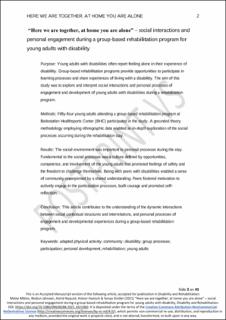| dc.contributor.author | Miklos, Mette | |
| dc.contributor.author | Jahnsen, Reidun | |
| dc.contributor.author | Nyquist, Astrid | |
| dc.contributor.author | Hanisch, Halvor Melbye | |
| dc.contributor.author | Girdler, Sonya | |
| dc.date.accessioned | 2022-03-31T07:32:27Z | |
| dc.date.available | 2022-03-31T07:32:27Z | |
| dc.date.created | 2021-07-09T00:17:59Z | |
| dc.date.issued | 2021-05-17 | |
| dc.identifier.citation | Disability and Rehabilitation. 2021, ?-12. | en_US |
| dc.identifier.issn | 0963-8288 | |
| dc.identifier.issn | 1464-5165 | |
| dc.identifier.uri | https://hdl.handle.net/11250/2988701 | |
| dc.description.abstract | Purpose: Young adults with disabilities often report feeling alone in their experience of disability. Group-based rehabilitation programs provide opportunities to participate in learning processes and share experiences of living with a disability. The aim of this study was to explore and interpret social interactions and personal processes of engagement and development of young adults with disabilities during a rehabilitation program.
Methods: Fifty-four young adults attending a group-based rehabilitation program at Beitostølen Healthsports Center (BHC) participated in the study. A grounded theory methodology employing ethnographic data enabled an in-depth exploration of the social processes occurring during the rehabilitation stay.
Results: The social environment was important to personal processes during the stay. Fundamental to the social processes was a culture defined by opportunities, competence, and involvement of the young adults that promoted feelings of safety and the freedom to challenge themselves. Being with peers with disabilities enabled a sense of community underpinned by a shared understanding. Peers fostered motivation to actively engage in the participation processes, built courage and promoted self-reflection.
Conclusion: This article contributes to the understanding of the dynamic interactions between social contextual structures and interrelations, and personal processes of engagement and developmental experiences during a group-based rehabilitation program. | en_US |
| dc.description.sponsorship | Funding provided by Sophies Minde Foundation and Beitostølen Health Sport Center for this study. | en_US |
| dc.language.iso | eng | en_US |
| dc.publisher | Routledge | en_US |
| dc.relation.ispartofseries | Disability and Rehabilitation; | |
| dc.rights | Attribution-NonCommercial-NoDerivatives 4.0 Internasjonal | * |
| dc.rights.uri | http://creativecommons.org/licenses/by-nc-nd/4.0/deed.no | * |
| dc.subject | Adapted physical activity | en_US |
| dc.subject | Disabilities | en_US |
| dc.subject | Group processes | en_US |
| dc.subject | Participation | en_US |
| dc.subject | Personal development | en_US |
| dc.subject | Rehabilitation | en_US |
| dc.title | “Here we are together, at home you are alone”–social interactions and personal engagement during a group-based rehabilitation program for young adults with disability | en_US |
| dc.type | Peer reviewed | en_US |
| dc.type | Journal article | en_US |
| dc.description.version | acceptedVersion | en_US |
| cristin.ispublished | true | |
| cristin.fulltext | original | |
| cristin.fulltext | postprint | |
| cristin.qualitycode | 1 | |
| dc.identifier.doi | https://doi.org/10.1080/09638288.2021.1921060 | |
| dc.identifier.cristin | 1921103 | |
| dc.source.journal | Disability and Rehabilitation | en_US |
| dc.source.pagenumber | 41 | en_US |

